India's First Unicorn The Journey Of Mu Sigma With Dhiraj Rajaram
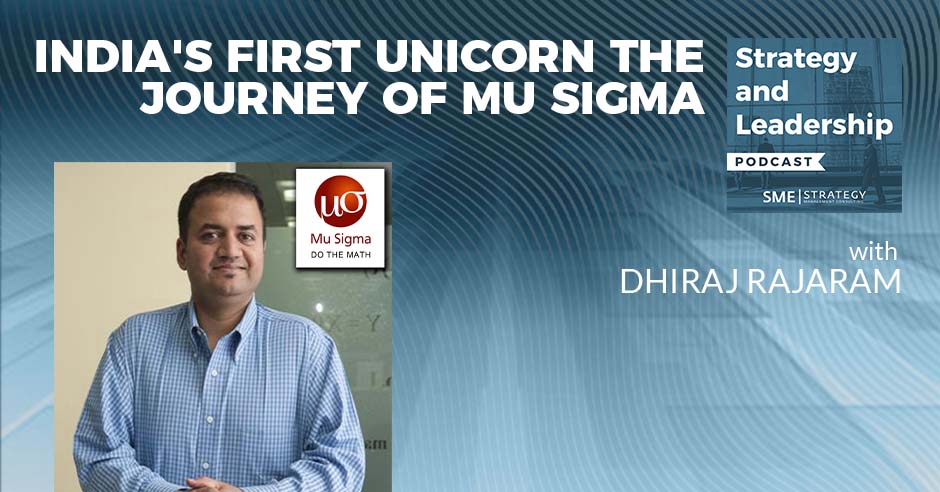
India’s first unicorn gallops its way into this episode of Strategy and Leadership Podcast. Today, the Founder and CEO of Mu Sigma, Dhiraj Rajaram, takes us into the journey of Mu Sigma in becoming India’s first unicorn and how he leads the company to its success. He also mentions how data and information shape the decisions of leaders and why that is important. Dhiraj explains that organizations should not solely focus on making new things but also learn to create the capacity to build those things. Dhiraj’s prowess in his business radiates the power of data-driven decision-making in paving business growth. Join us in this episode and be inspired to lead your business towards success.
Listen on Spotify: https://open.spotify.com/episode/51lJkLGUZNTl8UtGB3jnNN?si=6e0419d7749148ba
Listen on Apple Podcasts: https://podcasts.apple.com/ca/podcast/indias-first-unicorn-the-journey-of-mu-sigma/id1202449526?i=1000645027538
Want to continue the conversation with other leaders around the world? Join our Strategy and Leadership community.
https://strategy-and-leadership.mn.co
► Subscribe to our channel for weekly videos on strategy & leadership: https://www.youtube.com/channel/UCOHLNRrpk3rGUdg7qUQjiog/?sub_confirmation=1
➡️ Looking for a sample agenda for your strategic planning offsite? https://www.smestrategy.net/blog/sample-strategic-planning-agenda
Connect with us:
► Contact us: https://www.smestrategy.net/contact
► Connect with Anthony on LinkedIn: https://www.linkedin.com/in/anthonyctaylor604
About SME STRATEGY CONSULTING:
SME Strategy is a management consulting firm that specializes in helping organizations develop and implement their strategic plans. We work with teams to facilitate conversations about strategic direction and business strategy so that our clients can focus their energy on what will move them forward faster.
► Work with us: Are you looking for someone to facilitate your strategic planning process? https://www.smestrategy.net/strategic-planning-facilitator
► Check out our Strategy & Leadership Podcast: https://open.spotify.com/show/4yND4JKofh64gcvyvcLMqW
► Check out our online course on how to successfully lead your next strategic planning process: https://courses.smestrategy.net
---
Watch the episode here
Listen to the podcast here
India's First Unicorn The Journey Of Mu Sigma With Dhiraj Rajaram
My guest is Dhiraj Rajaram, the Founder of Mu Sigma. He warned me to make sure that my expectations were not too far away from the average. For any of you math geeks, you are going to find that hilarious. Everybody else will have no idea what I'm talking about, but that's okay. Dhiraj has built an incredible company in the industry. I don't even know if it's an industry, a field, or the world that we live in, but he is managing data and interpreting it. I really love the perspective that data is like crude oil. It depends on what you do with it. It's beneath seeing what other organizations have done working with your company.
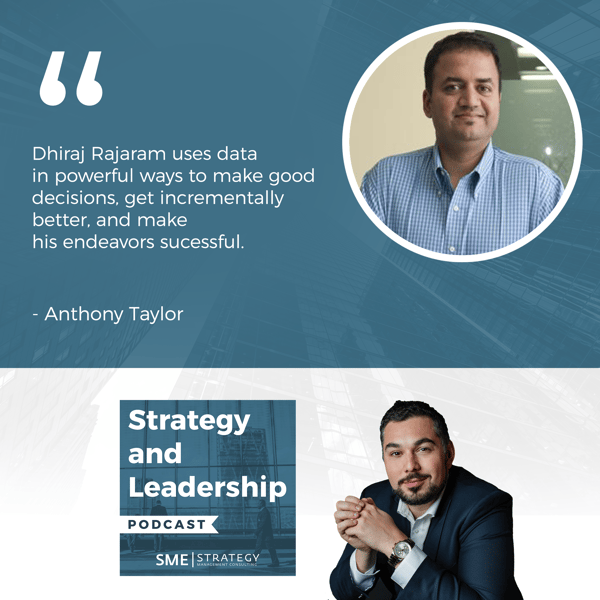
Dhiraj, thank you so much for joining us.
Thank you so much. I appreciate you having me over.
Please feel free to put more math jokes throughout the episode. I am more than happy to do that. My friends know that I love puns. I'm a nerd, so I'm excited for that. Why don't you tell our audience a little bit about your origin story and how you founded Mu Sigma several years ago and then I'll get into some questions with you?
Sure. Thanks again. I'm the Founder of Mu Sigma. We started in late 2004, early 2005. We worked with over 140 Fortune 500 clients. The thinking behind the company is that as the world keeps changing faster, organizations need to see and look at their own businesses with new eyes. They need to change the way they think about problem-solving inside their organizations.
Certain big themes that we observed were that the world is going from a bigger-is-better world to a faster-is-better world. We are competing less on economies of scale and more on economies of speed. In such a world, we are all being asked to produce not just products and services but experiences. Therefore, a world of experiences in the world of interactions is quite connected with each other.
How should you think about problem-solving? In the past, we've been thinking about it as separate entities. We feel that the future that we are already in is one where we have to think about problem-solving as interactions. To put this in perspective, you and I are entities in this show, but what we produce together is an interaction. Our audience is going to see this interaction.
Doing all the things to make interactions between math, business, technology, behavioral science, and design thinking is going to become important. Doing everything to make interactions between marketing, supply chain, risk, and product is going to be interesting. That kind of world requires new capabilities or a new kitchen in which you can make those types of food. That's what Mu Sigma has been working on with large Fortune 500 companies as their transformation Sherpa. It's their climb, for sure, but we are with them during that climb making sure that they can do well. That's the company.
We happened to also be India's 1st or 2nd unicorn, depending on who you ask and how you ask. We took in about $14 million of primary capital from very reputed investors. That included people like Sequoia Capital, General Atlantic, FTV Capital, and all of these guys. That included a whole bunch of secondary also. We returned about $900 million to all of them. We built a very valuable business that has strained more than 15,000 people on what we think of as a new way to think about problem-solving while helping all of these Fortune 500 clients. That's the company at a very high level and my background. Hopefully, that gives you a setup to ask me questions.
This is one of the couple of things that I take away. One is how fast the world moves, but not in the sense that it needs to move fast. It's the complexity and the essence of the fact that everything is interaction. You have everybody moving fast and everybody making these big decisions arguably better, larger, and faster than ever before. Your ability to make sure that those interactions are impactful or voluminous are the “best ones.” What is the approach that you take to support long-term fundamental and sustainable thinking? That goes across all gamuts. It's not, “Where do we sell? How do we market?” It is, “How does every aspect of our organization do that?”
The fact that you work with these Fortune 500s who are, from one point of view, making the largest economic decisions in countries, it serves them well to bring as much insight, context, and thought process into it. How do leaders like yourself and others do that while supporting good business? If the answer was always to extract as much as possible, A) They might not be the best fit for you. I'm not saying that they are, but the ability to be able to make those decisions.
What I truly like looking at your website is the Trimurti in terms of the concept of how you make decisions and looking at the past, present, and future, and presumably incorporating that into how you want people to think about decision-making. If you were to support our audience in better decision-making, whether that’s understanding more math or looking conceptually, A) What would you encourage them to do or B) How do you approach decision-making personally distinct from a company?
Let me take a step back and first ask to take your question and elaborate on it a little better. What's a good decision? If I were to ask myself that question, a good decision has two components to it. One is the big T, which is Truth. The other is the small T, which is the Time it takes to make that decision or time to get to that truth. Through that, your confidence level is high enough to take action, and so on and so forth.
While you introduced us by talking about data being the crude oil, the big D is not Data. The big D is Decisions. There's a reason why we say crude oil. It is because a lot of refining on that oil has to happen before you make it useful and create energy out of it. Therefore, this aspect of data, facts, unarguable things, and objective things are evolving into dialogue. From there, they evolve eventually into decisions. By that time, the objective has to give away to some amount of subjectivity, which is going to be very important.
We also see that the world that we live in has more parts than before and more parts that interact. Through which there is an increase of complexity, address this complexity through detailing. You have to detail stuff. You are not making the decision with your eyes fully wide open. The ability to address complexity, seeing the parts in your business, seeing how they interact, and understanding how the parts are changing and how the interactions are changing to see the whole system more holistically is going to become very important.
Can you outline detailing for me so I can understand if it's a capital D Detailing? What do you mean by detailing?
It is getting to the details of stuff. You could tell me you live in Palo Alto, or you could tell me that you live on a certain street or at a certain address right next to a location. The more details you give me, the more interesting and useful that information becomes to anybody doing anything with that information. That aspect of getting to the details allows you to address complexity.
The explanation was the more detail you have, the better decision you can make. If you stay at surface-level data, you can make service-level decisions. I don't know if that wasn't necessarily what you were saying, but that's what I got from it. I interrupted you in terms of both how you were thinking of decision-making, the truth, the time to truth, and then how you use that information to refine.
If you've got anything else to share there, otherwise, I'll ask you this. What are you seeing from leadership teams as they go through the process of using the information that comes out of the work you do or the work they're being trained on? How do they come to those truths? How do they objectively decide what is the best given the level of detail that they're at?
If I were a leader of a large Fortune 500 company, I would be faced with change that's originating from various places. It can be the supply side. It can be the demand side. It could be geopolitical risks. It could be consumer behavior changes, or it could be new technology, which is constantly challenging the way you think about the world.
All of these are things that these leaders are faced with. If I am Walmart, Home Depot, or Procter and Gamble, I don't think my customer thinks about it. If I'm a marketing person in one of those things or a supply chain person, the customer doesn't care about where you are and your role inside an organization. He looks at it as a Walmart problem, a whole Home Depot problem, or a Procter and Gamble problem. This aspect of understanding what the 1st order and 2nd order effects are and the journey of the decision-making process is going to be very important.
The journey of the decision-making process will be very important.
The second thing we see is that in these organizations, the path that problem-solving used to take in the past was extremely linear. For every one current state, you had a future state and you could take a very linear engineering-based approach where you could go and hit the future state. In a world of much more uncertainty for every one current state, there could be multiple future states. Decision-making is not about getting to the right answer but even sometimes the less wrong answer.
In that world, your journey towards circling around all the future states, understanding those future states, and then deciding which future state you want to look at is going to become very important. A world of uncertainty, to a large extent, requires the organization to be a producer of optionality. In the past, you won through good execution and then good exploitation of that execution. Before you execute, you need to have a wide variety of options on which you can execute. Exploration becomes as important as execution more relative to the past.
When I say exploration, I mean creating options for yourself. When I say execution, be predictable and execute on any one of the options when you're choosing the path. Exploitation is the monetization part of making the money. This is going to become very, very important. Organizations that industrialize the exploration process can reduce the cost per question, and increase the curiosity quotient in the organization is going to become important.
As a layperson, I think about the possibility or the alternatives in a very rudimentary approach. It's a scenario planning-based approach of, “If this, then that.” I am using logic models or whatever to determine the least bad enough for yourself or the organization. What would you recommend or how would you think about creating optionalities in the future? Is it a culture of wondering or asking what if? Is it a function of making sure that you have a lot of thermometers, as a bad example? You can test the pulse or check the water. Is it extreme communication so that there are a lot of lenses on the alternate futures that could be possible for these organizations, business lines, teams, and people, or all of the above?
I hate to say this, but it's all of the above. From that perspective, many of these organizations will have to put structures in place. I am a foodie, so I like to use the following analogy. The food that you have made in the past is not the food you're going to make in the future. If you were to look at problem-solving and solutions as food for the problems you have, your hunger is the problem and you're making different kinds of food as the solutions.
If you are changing the food, you need a new kind of kitchen. The organizations of now are looking to make the new food with the old kitchen. That's not going to be possible. Many of these organizations have to work on learning new recipes for sure. At the same time, they also have to build a new kind of kitchen inside that will allow them to do more with fewer people, that will allow them to do more faster, and that will allow them to do more in a sustainable manner.
Last but not least, they have to build a new kind of kitchen that will allow them to be open to the fact that they might not know the problems they will face in six months, but they have to be ready to go solve those problems and have enough capacity and slack to solve those problems. All of this requires preparing them. That's what we are doing with many of these organizations.
Be ready to solve the problems and have enough capacity and slack in solving them.
I find that the food analogy, we have a lot of leaders who sometimes struggle to have their leaders or other organizations looking forward. To keep it saying, “If we do things the way we've always done them, we'll get the results that we always want.” It's not about doing new things but building new capacities. One of the things that I couldn't help but speculate on is that as an organization, a Fortune 500, let's say they are looking 10 years out. Their decisions in years 2, 4, 6, 8, 9, and so on will impact the 30, 40, or 50 years out based on their specializations and what they do or don't do. I find the longevity conversation so interesting.
Being a Millennial, there's a planned obsolescence. There isn't a build for the long-term. How can you build the sustainability of these organizations, given the complexity and the fact that an organization can come and can go? There are a select few that have continuously done innovation well. We've talked a lot about innovation as a thing that happens because a person did it, but less around A) Do they have the system to support innovation and B) What are the inputs of that system so that the ingredients and the kitchen match up to provide as close to a good recipe as possible? You still need good cooks even if you have a good kitchen and good food.
To take what you said a step further, this aspect of decision-making is an emergent phenomenon. A decision is not something that an individual makes, but a decision is, mostly in an organization, what interactions between individuals make. Therefore, that is allowing the right ecosystem for chemistry to happen so that you have the best possible emergent decisions occur more often.
It's also important that you have the ability to make wrong decisions and correct them. The weightage on the emphasis on always making the right decisions sometimes can put fear into people, and that slows things down in a big way. That's where the focus on the big T of Truth can hurt you with the small T of Time. Having the right optimization between the big T and the small T is going to become very important.
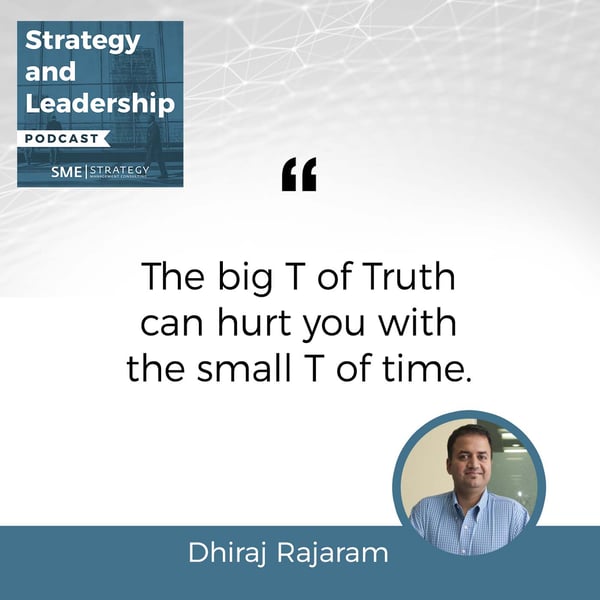
You used a very important word called complexity. It's the nature of our world to become more complex. That's built into our ecosystems. The very nature of complexity is that it's going to obfuscate things. The specifications of the organization start happening, and you have to be able to deal with that. Any organization is one where the purpose of the organization is to machine ideas.
The idea evolves. In the beginning, there's a content part of the idea with data, some facts, some hypotheses, and all of those things. It then becomes conversations between people. It gets socialized. The support gets built for it. When enough support is there, the business puts enough budget into putting it in the computing environment with software, databases, and all the good stuff. It then gets consumed and commercialized.
With all of this complexity that you talked about, the first thing that happens is there is a lack of transparency of all of the content. The spaghetti hides most of what is happening inside. The second thing is there is a lack of persistence in the conversations. We are all living in a world where our work is extremely interdependent, but our work schedules want to be independent. There's a lack of persistence in conversations. Eventually, there is a lack of cumulativeness of the work, so you end up doing one-off projects in different places. Solving all of this in a world of exploration requires new tools, new methods, and not just skillsets and toolsets but also new mindsets. We are living in interesting times.
In building the right ecosystem, when we talk about strategy implementation, we focus less on doing a bunch of tasks and make sure that the environment for that is supported. We speak the same language there. One of the things we think about is an acceptable level of failure. We had a guest talk about the perfection trap. It is that some people are so worried about getting the perfect answer rather than a good enough answer fast.
When I was getting married, I asked my friend, “Am I rushing into this?” He said, “Worst-case scenario, it's a speeding ticket.” I said, “Why?” He said, “If you go too fast, you pay a fine.” Sometimes, that's how it goes. Apologies to everybody. Anybody that's offended by that, I'm sorry. My wife and I are still together. We are having a great time. That’s how it goes for organizations that are trying to make decisions and, to your point, not the right decision but the best decision, and then balancing that with the data that you have versus the data that exists.
There are some decisions that are objectively wrong and end up being successful. For example, if he said, “I'm going to start up a business objectively,” there is a small sample size of successes relative to the many failures. There are certain product lines that, if you poll people, they would say, “That's not good. You’ll never buy it,” and then they become giant successes. It is managing that but then also having the system, the communication, and the transparency as an organization to understand, “We have to make certain decisions that are going to be better or worse for us.” Unfortunately, we're running low on time. I have two questions. One, I don't know if it's my view. Is that a pi symbol in your glasses or does it happen to look like that?
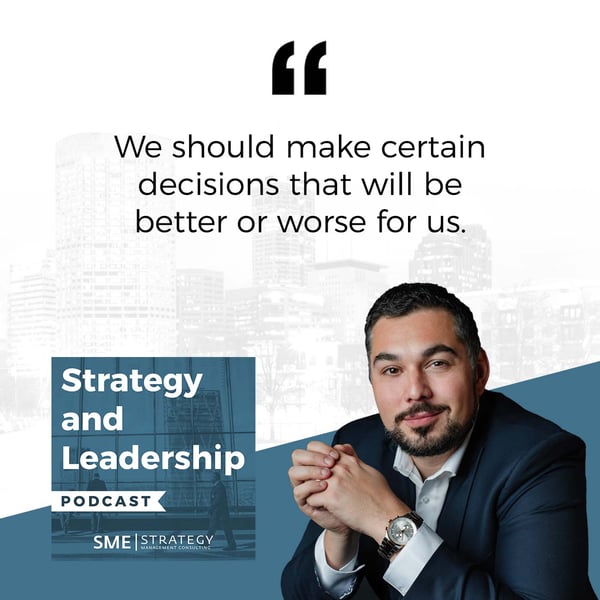
It looks like that.
I was going to ask you. Given that we have managers and leaders, some of them at the early stages of their careers, whether they have statistical modeling at their disposal or if they’re using scenario planning or alternative-based approach, how would you recommend that they start thinking about building those systems within their organization? Tell us 1 or 2 things that they could do to support that long-term, more systemic thinking in a complex world.
The nature of technology is to allow human beings to get more throughput and do more work in less time. That's the nature of technology. It is because of that that all of these complex statistics, economic rates, operations, research, AI, and everything have tools for that. If you are running a large organization, while you need to have an appreciation for that, you don't need to know all of that. Do you know how to pluck the right mushrooms if you are left in a jungle? Probably, you don't because you evolved to such a way that you can buy mushrooms in Whole Foods.
The nature of technology is to allow human beings to do more work in less time.
The same thing is happening with many things. You have lots of good tools, platforms, and processes to help you with that. It is the curation of that and making sure that you have the right teams who are structured to industrialize the exploration process. Information technology as a group was primarily used to industrialize the execution process. Build a better accounts payable system. Build an accounts receivable system. Implement the SAP ERP system.
When you want to build an exploration system, there happens to be an interaction between business and technology. It means the problem-solver technology and the solution consumer have to constantly speak to each other and interact with each other. We don't have those forums established well in large Fortune 400 companies yet.
The ability to take a muddy and fuzzy problem, take that problem statement, and convert it into a better problem definition, and before solving it, to look at various aspects of it and do it in a very iterative manner that has not yet happened in many large Fortune 400 companies. That's also one of the reasons why they get disrupted by smaller companies that still don't have that complexity. That's how I would look at it.
I will take the opportunity to plug myself. In SME Strategy, we facilitate strategic planning sessions and conversations so that you can get aligned as a team. We communicate the information that you need so that there is transparency and make sure that you can make the best “best decisions” for you long-term. Visit SMEStrategy.net if you're looking for somebody to support you with that. Reach out to Dhiraj and his team if you're looking for some more information on Mu Sigma. Where can people connect with you? Where can they learn more about the amazing work you and your team are doing? We’ll say goodbye for now.
We are at www.Mu-Sigma.com. Thank you for this opportunity. I hope this was useful for you.
It was fantastic. One of the things I'm taking away from this is the ability to make good decisions as an organization, whether they are big or small, and the interactions of all things within the business and how they lead up to it. People are inundated with data from the marketing and sales side, and they're used to it. The proliferation of opportunities and their industrialization, the ability to do that, is what's going to set these organizations apart.
If you're interested in the stock market, those are some things. How good are organizations that do that? That’s even from business sustainability, innovation, and, on the social side, solving the world's problems. We have a lot of problems. Our ability to industrialize those ideas will drive that solution. Hopefully, people get better at it faster. Thank you so much for sharing with me again. It was such a pleasure. I wish you all the best moving forward.
Thank you.
‐‐‐
My guest is Dhiraj Rajaram, the Founder of Mu Sigma. One of the things that I take away from you is to have those conversations as an organization to create those, dare I say, collisions. It is having good data, the right amount of data, and transparent data so that everybody can make decisions. It is then balancing truth and the time it takes to get to the truth. The time to truth will help your organization get better. Don't try to solve it. Get incrementally better so that you can make better food. This has been the show. Dhiraj, thank you again. Thanks for tuning in.
Thank you.
We'll see you next time.
Important Links
About Dhiraj Rajaram
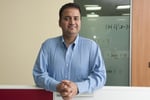 Dhiraj is the founder and CEO and Mu Sigma where he leads strategic direction and works closely with fortune 500 companies to apply decision science and solve business problems. Dhiraj is a former Booz Allen Hamilton and PwC management consultant and is a distinguished alumni from the University of Chicago, Booth School of Business. He was named Fortune Magazine's 40 Under 40 and an Ernst & Young Entrepreneur of the Year.
Dhiraj is the founder and CEO and Mu Sigma where he leads strategic direction and works closely with fortune 500 companies to apply decision science and solve business problems. Dhiraj is a former Booz Allen Hamilton and PwC management consultant and is a distinguished alumni from the University of Chicago, Booth School of Business. He was named Fortune Magazine's 40 Under 40 and an Ernst & Young Entrepreneur of the Year.


